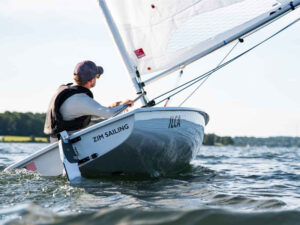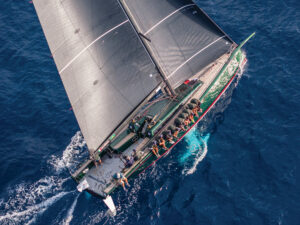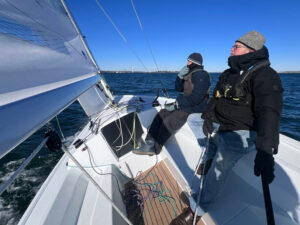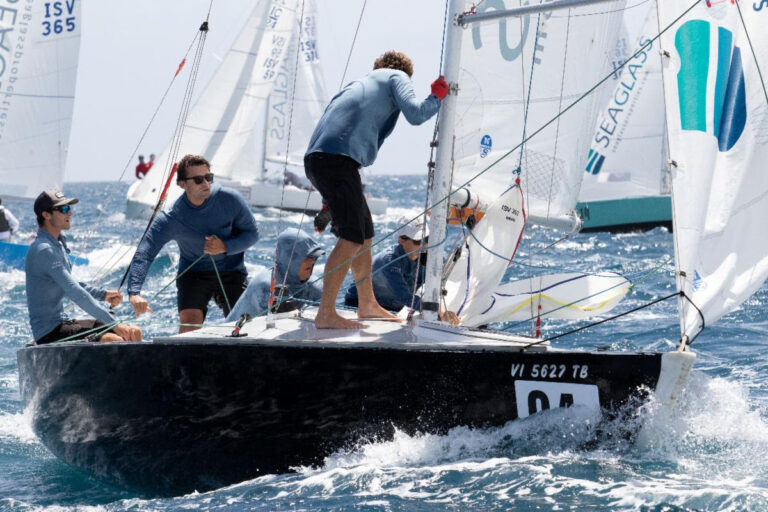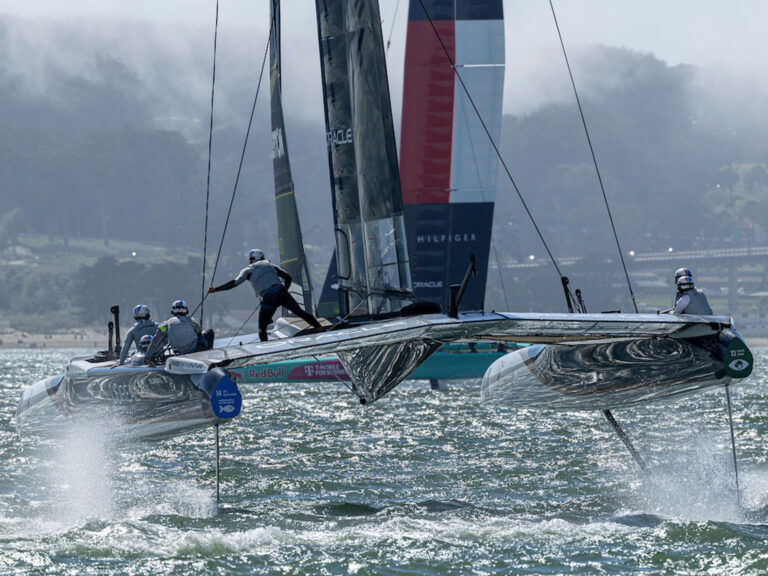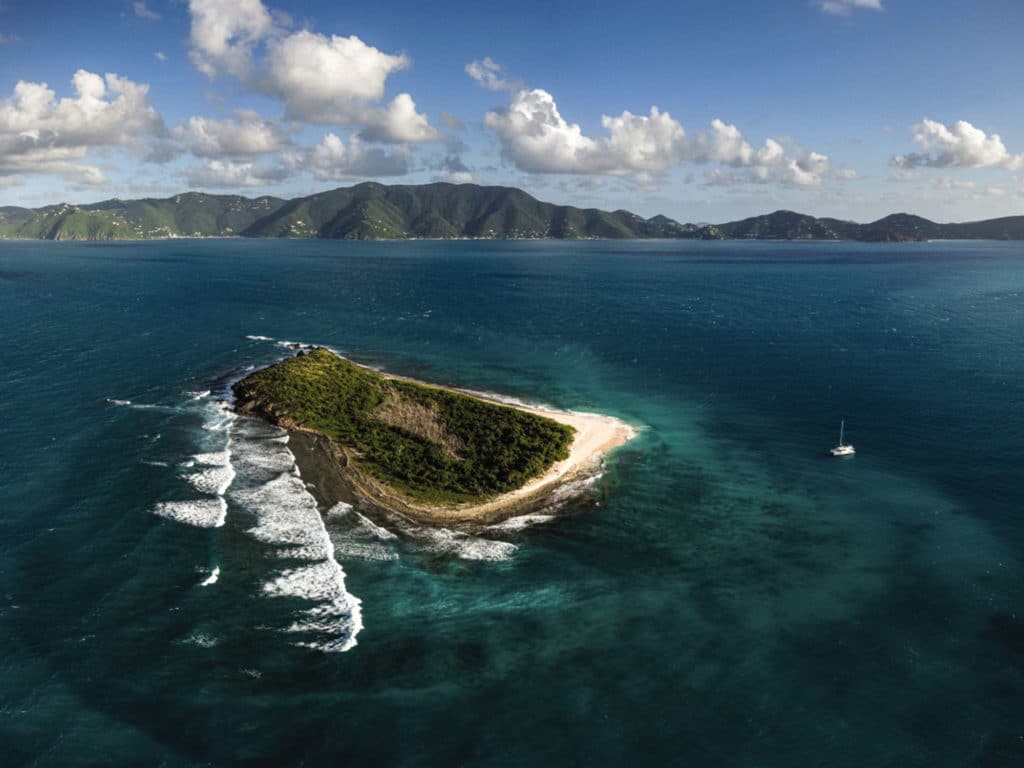
It was the second full week of December, and in case any of us needed a reminder as to the time of year, the Christmas winds had Sir Francis Drake Channel in the British Virgin Islands frothing with whitecaps. And, of course, we were bashing straight into them as we left the Mooring’s docks at Wickams Cay on Tortola under power, bound for Deadman’s Bay on Peter Island to scope out a site for a photo shoot later in the week.
The three us aboard the Moorings’ 4500 Baba Jaga that afternoon—Moorings marketing VP Josie Tucci, photographer Jon Whittle, and me—were technically all on the clock. Our job? To have a good weeklong romp through the islands, attend to just enough business to call it a “work trip,” but mostly, confirm that yes, even in a pandemic, the British Virgin Islands are still a sailor’s paradise. So far, they were looking pretty good to me. I’d left frozen Boston a day earlier and arrived on Tortola in time to enjoy a lazy afternoon with a cold beer and late lunch before the sun set, and my mates arrived with their complimentary welcome-to-the-islands rum punches in hand.
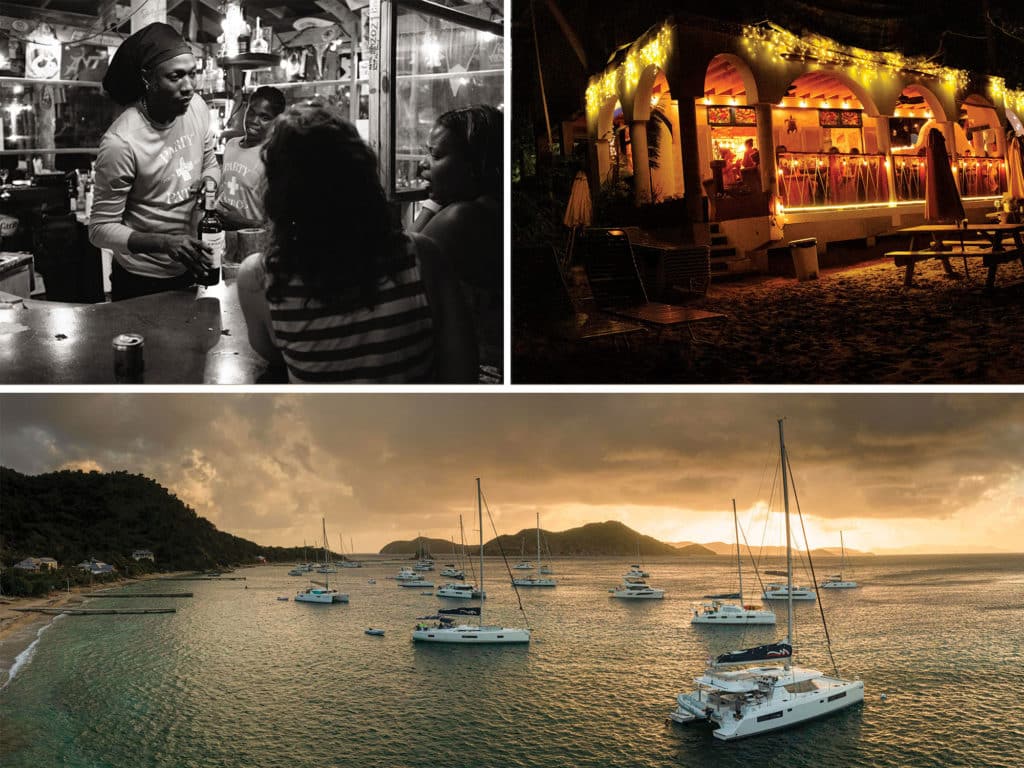
These days, rather than conducting large group briefings, the Moorings asks charterers to watch safety and boat videos before arriving. The upside is that the actual in-person boat walk-through is short and to the point. So, the next morning, while Tucci met with her team at the base and Whittle worked on videos, in less than an hour, a dockhand showed me how to turn on the 35-gallon-per-hour watermaker, fire up the genset, and where to find breakers and shut-off valves for the water system and heads.
Next on the agenda was a tour of the Wickams Cay complex with Oliver Kinchin, head of customer operations for the Moorings and sister company Sunsail.
I’d taken a similar tour two years earlier during a visit for the Moorings’ 50th reunion. At that time, the base had just reopened following the devastation caused by hurricanes Irma and Maria, and nearly every structure was a work in progress. This time, it was well on the way to reawakening from what Kinchin called a yearlong “COVID rest,” when the islands were closed to visitors, and boats sat mothballed at the dock.
With travel restrictions easing and charter bookings pouring in, the staff was scrambling to get the fleets back up and running, and also to complete several ongoing post-hurricane improvements to the on-site hotel, a waterside restaurant and other support facilities.
Our tour included a visit to the new sail loft, which currently is packed with sails and cushions saved from boats lost or damaged by the storms that struck in 2017. The task ahead is to inventory and inspect the contents of hundreds of sail bags to decide what can be saved and what gets tossed. Eventually, a full-service sail and canvas shop will fill the space.
We visited the new-parts warehouse, where row after row of shelves were organized with cubbies and bins holding the countless bits and pieces needed to meet tight turnaround times for several hundred sail and power charter boats. And we took a stroll through what will be a new on-base provisions store once it opens sometime this winter. Factoring in the COVID rest, the progress was impressive.
And then we were off. All it took was a quick call to the dockmaster on the VHF, and dockhands appeared, lines were hauled aboard, and we were on our way.
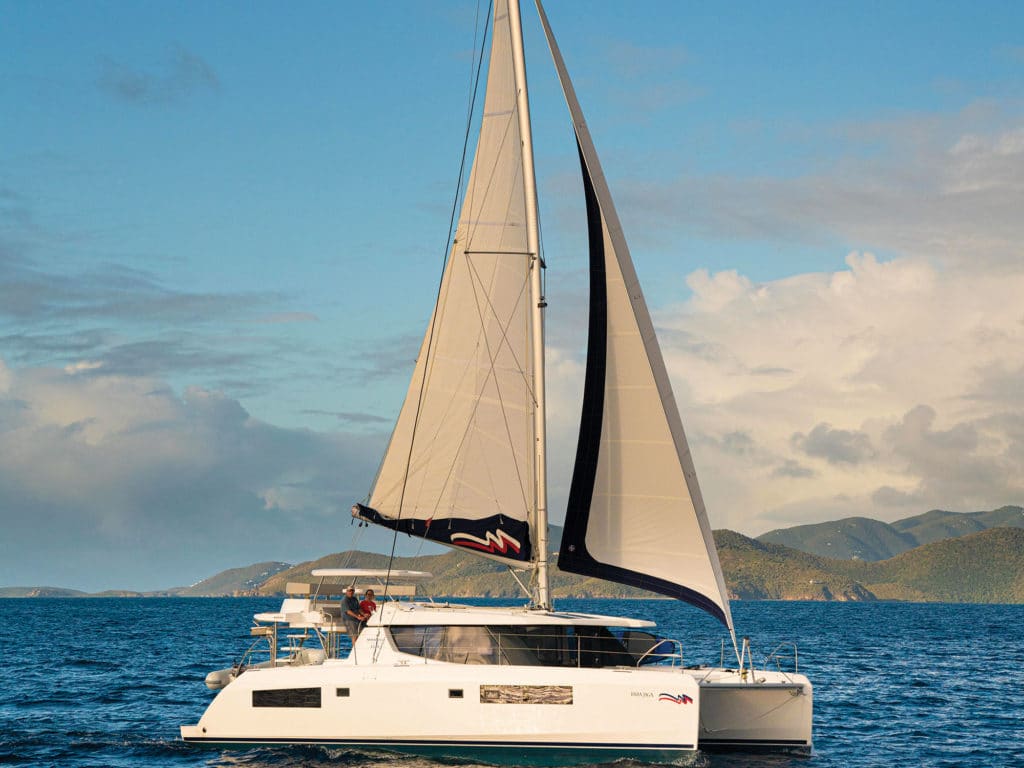
When I visited two years earlier, all the islands bore deep scars from the powerful tropical storms, but Mother Nature had done a remarkable job of repairing things. Approaching Peter Island, the hills were a vibrant green, and the long sandy beach at Deadman’s was as clean as a whistle. It would work just fine as a backdrop for sailing shots of the new Moorings 4200 catamaran, the first of which had just arrived in the islands.
Our stop for the night was Cooper Island. Though several boats were already there, we found an open mooring ball close to shore. Tucci on one bow and Whittle on the other deftly wove their dock lines through the eye of the mooring pendant and cleated them off. That left us with nothing to do but swim, enjoy cold Caribes on the flybridge, and watch gusts dance across the water. In the evening, the Cooper Island Beach Resort’s Rum Bar lured us ashore. Inside we met a couple of charter skippers and their mates from St. Thomas, who were enjoying a last busman’s holiday before a busy winter season catering to guests. But honestly, we had our own work cut out for us choosing what to sample from shelves stacked high with exotic rums from around the world.
The next morning, Wednesday, our little crew cobbled together a rather loose itinerary for the next few days. A sail to Anegada was out. Getting there and back would eat up two days, and besides, at the last minute, Tucci had talked a Florida friend, Trish Gordon, into joining us, and we had to pick her up Thursday night in Trellis Bay. That gave us Wednesday to pay an obligatory visit to the Baths, the iconic rock formations on nearby Virgin Gorda, and then make the run up to North Sound to see what progress was being made rebuilding the Bitter End Yacht Club.
Over breakfast, I took advantage of the onboard Wi-Fi and checked the Windy app on my phone. Wow, we were in for a breezy week. That fact was further confirmed the minute we left the lee of Cooper Island and started bashing headlong into 25- to 30-knot winds and the resulting lumpy seas.
At the Baths, we grabbed a day mooring, launched the dinghy, and headed for shore. But on the way, we ran into the charter skippers from the night before. They’d just come from the beach, where a long line of tourists from a cruise ship anchored off in the distance waited for their turn to follow the path through the boulders. No way we were up for that COVID party. Instead, we returned to the mothership and resumed our bash north.
To starboard of Baba Jaga, thick clouds loomed over the peaks of Virgin Gorda; behind us, the islands to the south disappeared in a massive squall. Then, by Great Dog, it was our turn to get soaked. My lightweight slicker didn’t stand a chance against the pelting rain that engulfed the boat and sent Tucci and Whittle running for the saloon. Instantly we were surrounded in a whiteout, and I throttled back the diesels so we just crept along through screaming 40-knot gusts.
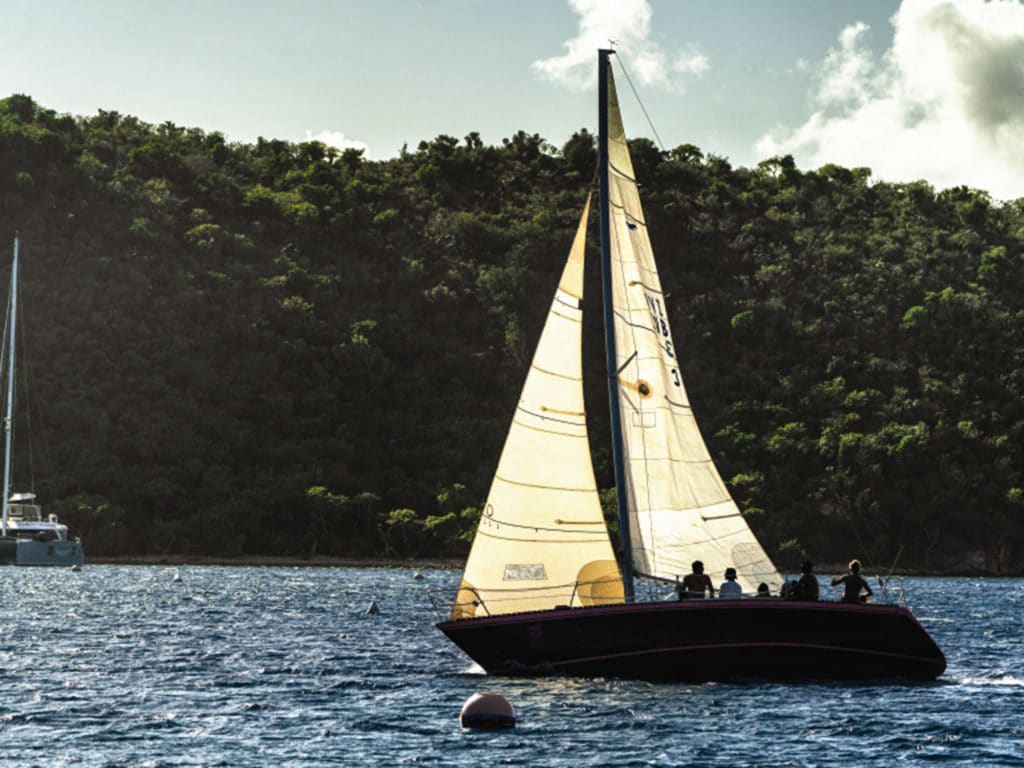
It was a fast-moving tempest, though, and I was nearly dry as we ran down the channel into North Sound. Inside, the wind picked up again, and just as we were about to grab a mooring at the Bitter End, the skies opened once more. As we motored in a circle to let it pass, one gust sent the two sun cushions atop the Bimini flying. Whittle caught one, and we had a lively time trying to chase down the other and grab it with a boat hook. Thankfully, a couple of women on a nearby boat jumped into their RIB and retrieved it from the drink for us. And speaking of drinks, I was ready for one by the time we found an open mooring just off the Bitter End’s new dock.
The Bitter End has been a sailor’s playground since it opened in the early 1970s, but the resort, like the one on nearby Saba Rock, was flattened when hurricane-spawned tornadoes ripped through, leveling anything and everything in their paths.
It took several months to settle insurance claims, and many more to clean up the carnage, but eventually work began on a new and better Bitter End. When we paid a visit, a “soft opening” was scheduled for the following week.
So far, two overwater bungalows, part of Marina Lofts, have been finished, and plans are to add three more. The small two-story cottages each have their own dock and porch overlooking the harbor, where 72 guest moorings have been installed.
Next to the lofts, the staff was scurrying to put the final touches on the Quarterdeck lounge and restaurant. Much of the wood throughout these buildings, and the rest of the nautical village, was recovered and repurposed by a team of some 70 construction workers. A provisions market, pizza kitchen, boutique and kids play area were also being readied for the first visitors. Resort marketing director Kerrie Jaffe told us that for this winter, the emphasis was on getting the waterfront and marina reopened. Eventually, though, private homes will be built on the 64-acre property.
From the Bitter End, we took the dinghy across the channel to the latest incarnation of Saba Rock resort. It had reopened a couple of months earlier. The first-floor dining room was busy when we pulled alongside the dock that surrounds the building. Upstairs, the open-air bar was bustling too, and of course we had to sample their signature drink, Saba on the Rocks, made from spiced rum, passion-fruit puree, triple sec and orange juice.
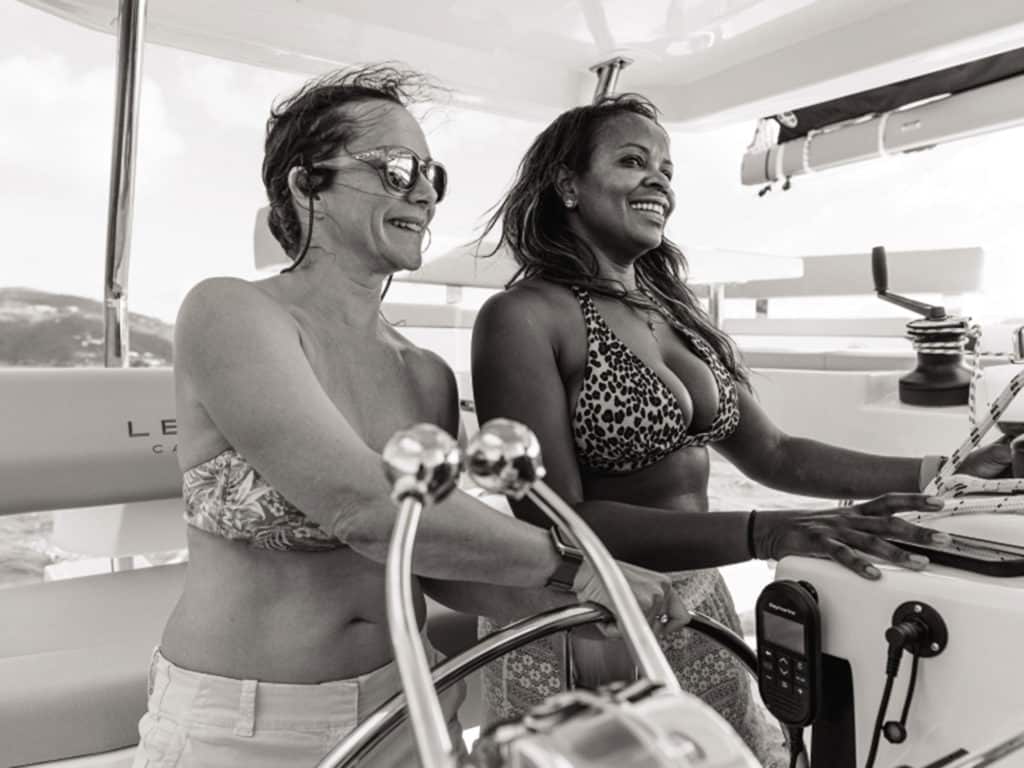
The new Saba Rock includes seven guest rooms and three suites overlooking North Sound on one side and Eustacia Sound on the other. They’re pricey—$700 a night in high season—but the views are out of this world.
Thursday, after a morning swim and breakfast, it was time to go sailing. Another day of big trade winds was forecast, but at least it would be from behind us. With two reefs in the main, we traced our tracks back out of the sound, then unrolled two-thirds of the jib as we bore away toward Spanish Town. We stopped there for a stroll and lunch, and then set off on a delightful downwind run to Beef Island and Trellis Bay under just the jib. Alone at the helm, I turned on the autopilot, kicked back, and watched the haze-shrouded islands 5 miles ahead slowly come into focus.
The sun was low in the sky by the time we grabbed one of the last moorings near the airport in Trellis Bay. Scanning the beach, I was pleasantly surprised to find that crews had removed nearly all the damaged boats that had littered the shore on my last visit.
With Gordon aboard and Baba Jaga’s fourth cabin finally filled, we set off bright and early Friday to explore the remaining islands in the chain. We stopped for breakfast at Diamond Shoal, a must-visit snorkeling spot alongside Great Camanoe Island. From there, we hopped around to Monkey Point on Guana Island. On previous trips, this had always been the place to see big swarms of baitfish and tarpon on the prowl, but not this time. After a quick dip, we hoisted the still-double-reefed main for a lively downwind run to Great Harbour on Jost van Dyke.
Tucci took the helm, and I wandered forward to one of the seats on the bow to take it all in: the towering peaks and valleys on Tortola, the sparkling sunlight, the clouds casting shadows on the water, the wind, the swells. Boy, what a sail.With a hiss, Baba Jaga would catch a wave and ride it until its bows buried in a trough. Then another puff would hit, and we’d take off again. It was definitely a ride to tuck away and revisit on a cold New England night back home.
That evening, a rocking reggae band drew a comfortable-size crowd to Foxy’s, another indication that folks are ready to come back to the islands in search of some fun. We found that true the next morning as well, when we squeezed in behind the reef at White Bay to drop an anchor off the beach. A swell was running and the breeze gusted around the point, so I returned to the boat to stay on anchor watch while the rest of the crew went ashore for Painkillers and lawn games. They even got to watch a wedding take place at the Soggy Dollar and chatted up the newlyweds afterward.
Late in the afternoon, we crossed back to Tortola and Cane Garden Bay. Ashore after sunset, we walked along the waterfront, past restaurants with bonfires burning on the beach in anticipation of the full moon that would soon rise over the mountain. At the end of the sand, we came to a lively scene at a bar and restaurant called the Indigo House. We sat down for drinks at one of the last open tables just as the owner, Valerie Rhymer, tinkled a knife against her glass and announced free shots for everyone in celebration of their first-year anniversary.
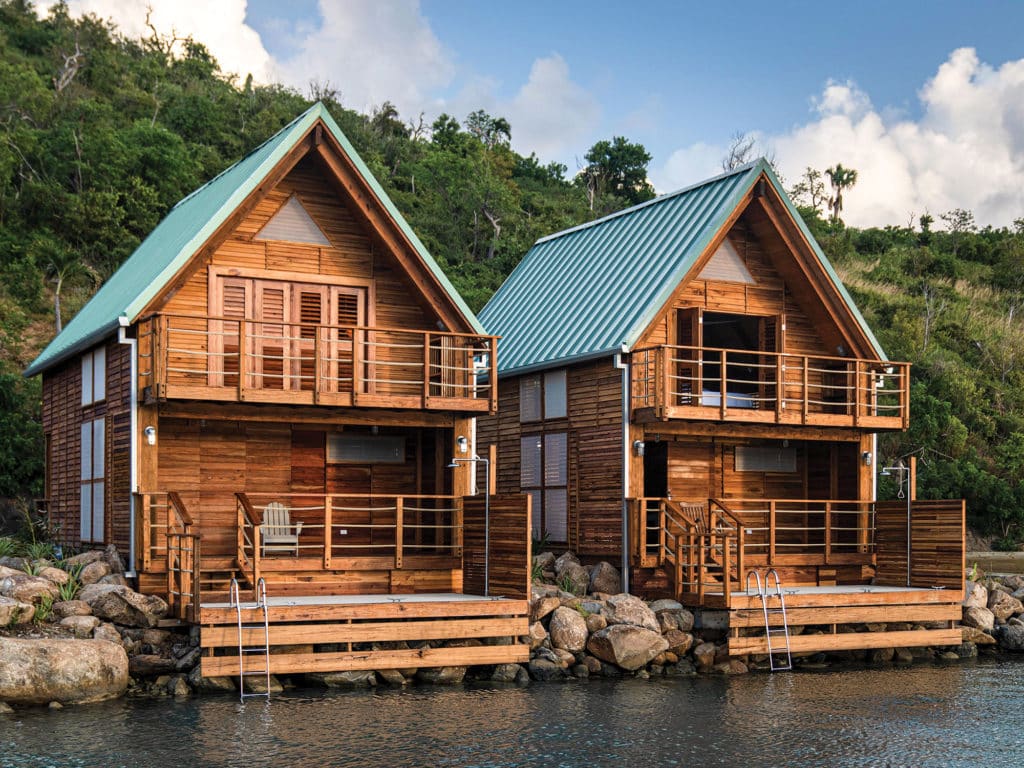
Later she and her husband, Kareem, joined us for a chat. She was a Florida girl who came to the BVIs in 1979 and sold boats for the Moorings in the early ’80s. Kareem was from Tortola but had spent several years in the States before returning home and opening Myett’s restaurant and hotel down the bay. For several years while raising their children, they’d lived in the house where we sat. Like so many others, it was destroyed in Irma, but after rebuilding, they decided to open it as a restaurant. So far, business has been good, thanks to loyal local patrons, many of whom work on various charter boats. Between sips of rum, Kareem admitted to feeling good energy now that the islands are coming back to life. He predicted a busy winter season ahead.
On Sunday, our last full day aboard Baba Jaga, we got going early and motored around WestEnd on our way to meet Richard and Shannon Hallett at Peter Island. They run a Moorings crewed charter boat, and it was a day off for them, but they too were on a working holiday, skippering the new 4200 for our photo session. It was still plenty windy, but they hoisted a full main and jib and reached back and forth as we chased along under power. When Whittle had all the photos and drone footage he needed, we tucked into the lee of Round Rock, set sail, and then bore away ourselves for two long jibes to the Bight on Norman Island.
The Willy T was the spot for Sunday sundowners. A steady stream of cruisers and charters came to the ship’s portside dinghy dock like moths to a flame. To starboard, the locals arrived in Cigarette boats and multi-engine center-consoles that they rafted alongside. Backflips from the floating bar’s upper deck were the dives of choice for this crowd.
And then, too early, it was time to return to Baba Jaga for one last dinner and a little stargazing on the flybridge.
Monday morning, Whittle hopped aboard with the Halletts to shoot our boat on the sail home to Road Town. Finally, overnight, the Christmas winds had settled down, and we were able at long last to shake the reefs out of the main. It was another outstanding trick at the helm, that close reach back to Wickams Cay.
Inside the harbor, a Moorings captain came out in an inflatable and jumped aboard to put Baba Jaga back in its slip. And with that, our job was done. We’d successfully navigated travel restrictions, visited the islands, and met many a person looking forward to, if not an entirely normal season, a busy one. And we’d gone sailing. That was the best part. Definitely. We’d gone sailing.
Pandemic Practicalities
None of or our crew had problems clearing into the BVI. Arriving by air at Beef Island, visitors were taken to a building next to the airline terminal. Inside, officials asked to see proof of vaccination, and a negative test result taken within four days of arrival. Those who had test results within 48 hours were free to proceed to customs. I did not, but rapid tests were available on-site for $50. All of this had been clearly spelled out ahead of time on websites maintained by both the charter company and BVI officials, so we encountered no surprises. In mid-December, masks were required throughout the BVI, and on Tortola, compliance appeared to be universal. On other islands, visitors and locals were more lax, but most activities took place outdoors, and we never encountered any concerning crowds. There were reportedly numerous sites in Tortola to get the required COVID test within 24 hours of returning to the States, but the Moorings and Sunsail had a medical person on-site to perform rapid tests for $125 a piece. Tucci had brought her own home kit, and those results were accepted as well at the airport, where we had to show proof of a negative test to get our boarding passes. To be honest, with a little research ahead of time, travel to the BVI, in my opinion, was no more complicated than it was in pre-pandemic times. Hey, it’s the islands!
Provisioning on the Fly
Our little adventure had been organized at the last minute, so close to our departure date, in fact, that paperwork for the boat and provisioning through the Moorings arrived after the two-week-prior-to-departure deadline for returning it. I went online and ordered basic provisions—water, paper goods, beverages and the like—from RiteWay, a supermarket across the road from Wickams Cay. These were delivered to the boat. As I unpacked the boxes, I checked the goods against my order list and found that a few items were missing. The delivery person was nearby, and agreed to return the next day with the rest of the order. • Then, with the gang all there, we drew up a longer shopping list for meats, veggies, snacks and libations, and made a run to the OneMart Superstore, which was recommended by a cab driver. A store employee, Edwin Salapare, picked us up at the charter base, helped us shop, and then back at the dock, he loaded our supplies into a handcart and hauled them to the boat. The staff at the base was happy to arrange for him to come, but one could contact him directly at 284-440-3027. He provided fantastic service, and we tipped accordingly.

